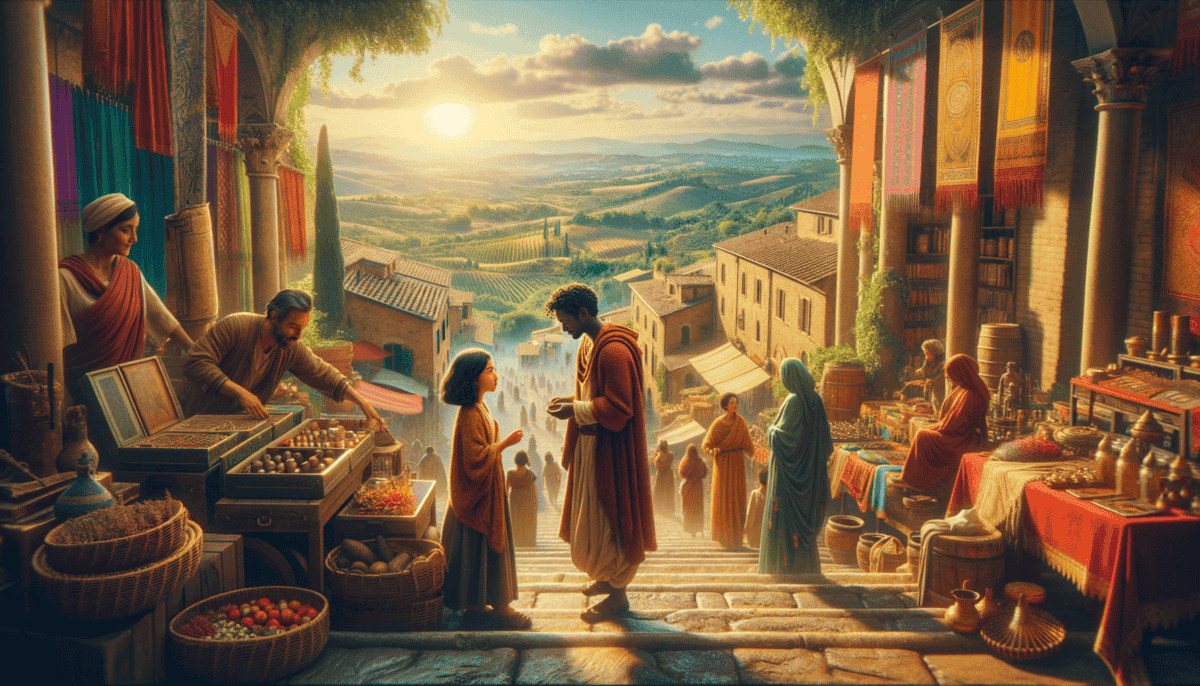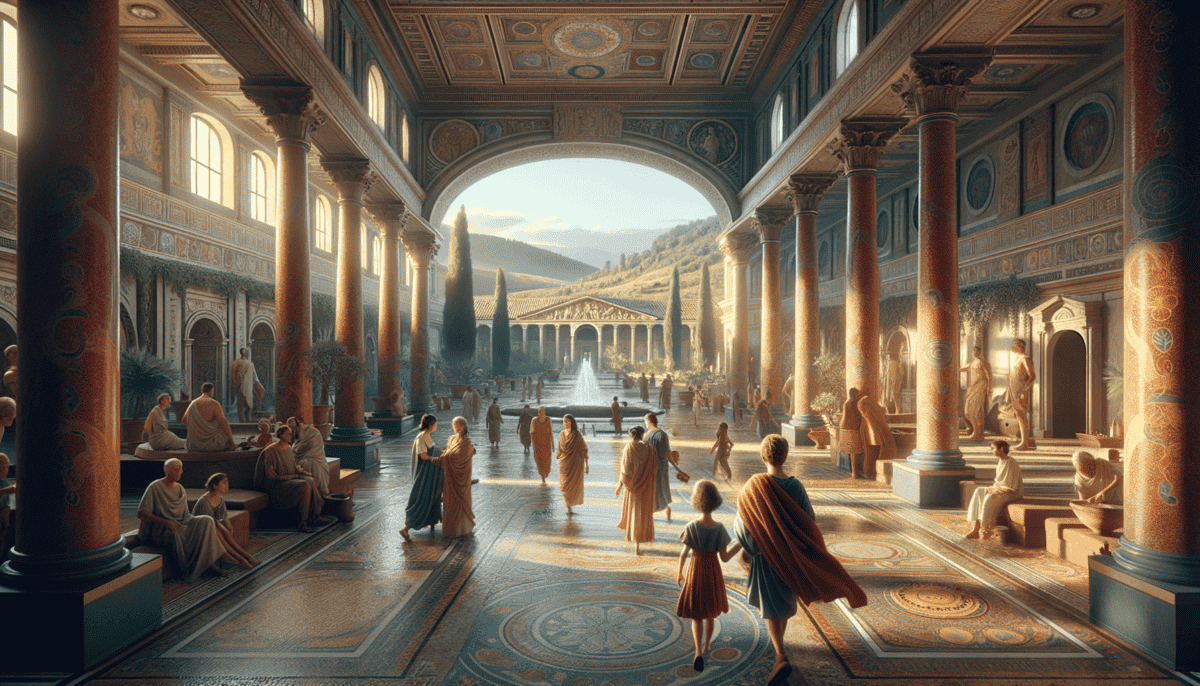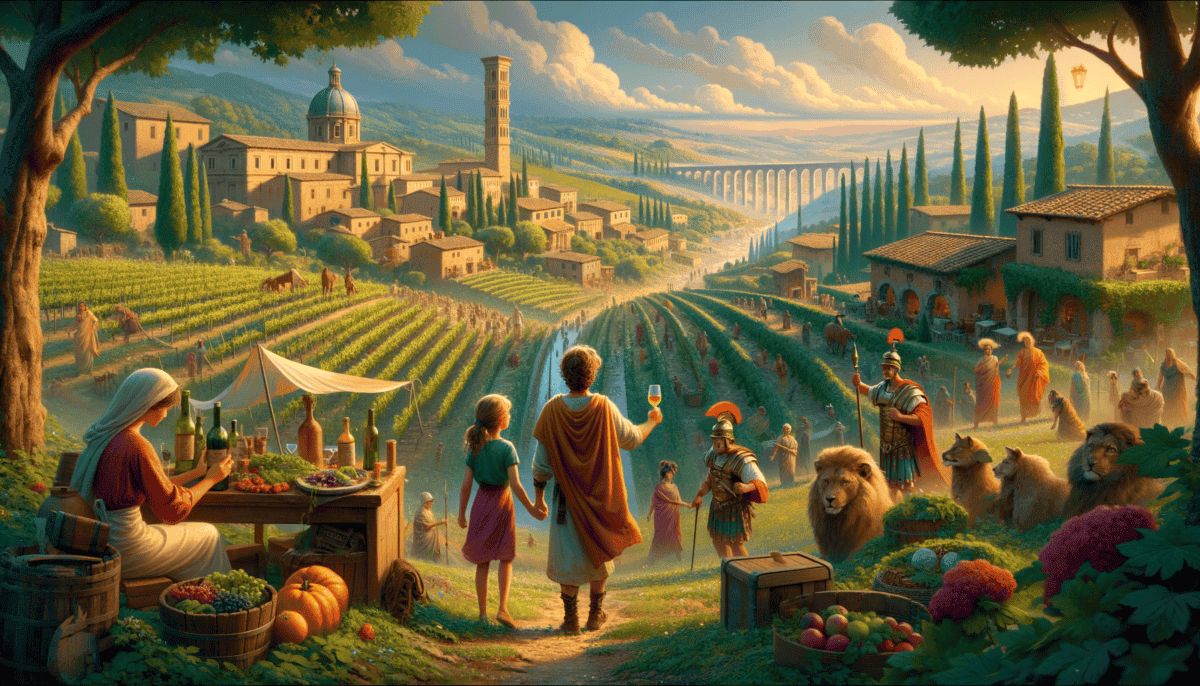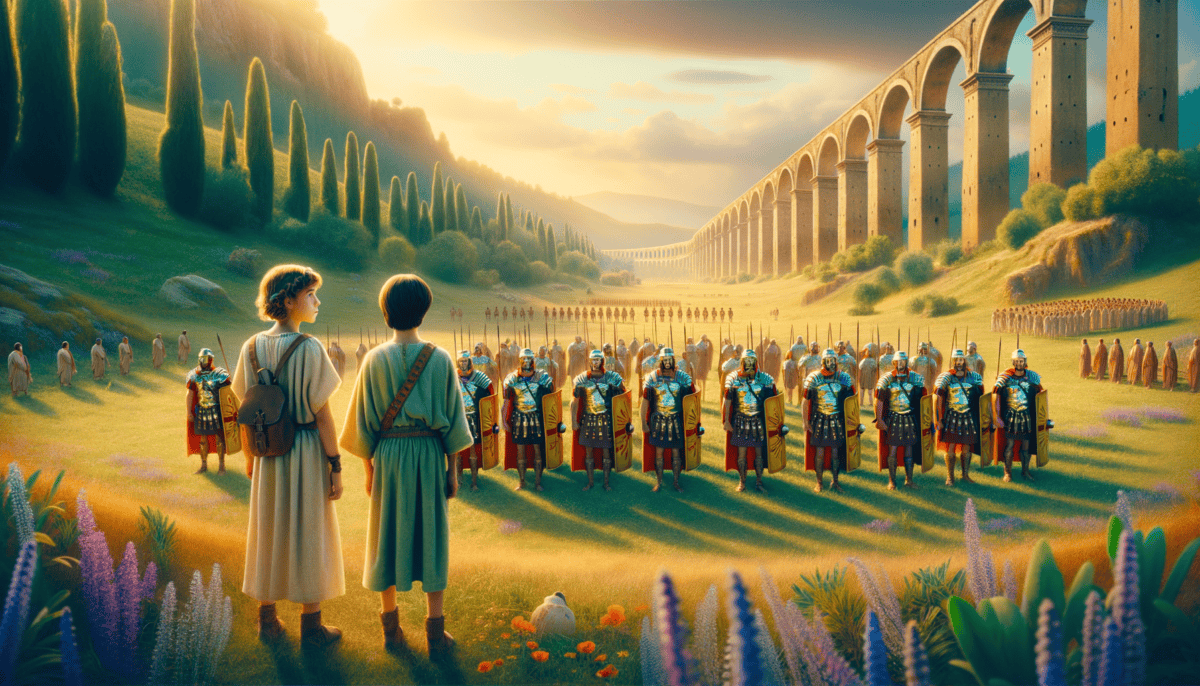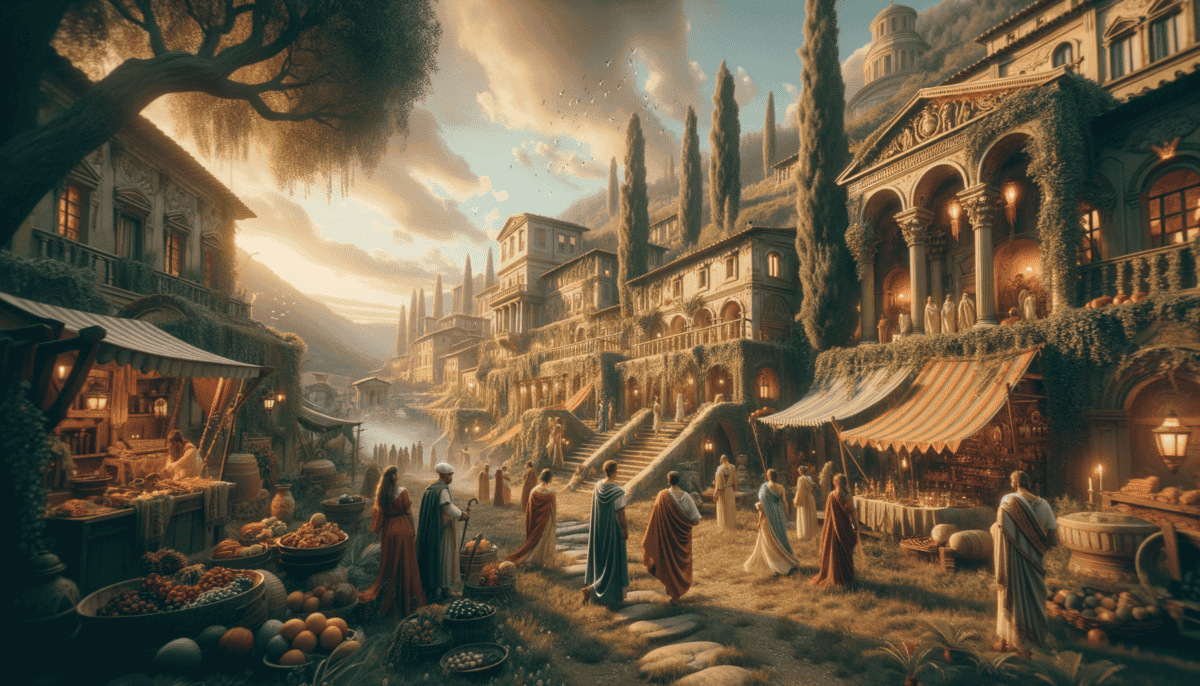The Mysterious Map
"Marcus, look what I found!" Livia called out, waving a dusty piece of paper. The sunlight streaming through the attic window made tiny dust particles dance around her head like fairy lights. ️
Marcus pushed aside an old trunk and crawled over to where his sister sat cross-legged on the wooden floor. At ten years old, he was two years younger than Livia, but they shared the same dark curly hair and love for exploring.
"What is it?" he asked, peering at the yellowed parchment in her hands.
"I think it's a really old map," Livia whispered, her brown eyes wide with excitement. "Look at these weird symbols and the writing – it looks like Latin!"
The siblings were helping clean their grandmother's attic on a sunny Saturday morning. But now, this mysterious discovery made the dusty chore feel like a treasure hunt.
"Grandma never told us about this," Marcus said, running his finger along the map's edge. The paper felt strange under his touch – warm and almost alive.
Suddenly, the map began to glow with a soft golden light. The Latin words seemed to float off the page, swirling around them like dancing fireflies.
"Marcus?" Livia's voice trembled. "What's happening?"
The attic started to spin, faster and faster. Colors blurred together like paint in a washing machine. Both children held onto each other tightly, too scared to even scream.
When everything finally stopped spinning, they weren't in their grandmother's attic anymore.
They stood on a grassy hill overlooking a beautiful valley. Below them stretched rows of olive trees and grape vines. In the distance, they could see stone buildings with red-tiled roofs and people wearing long, flowing clothes.
"Livia," Marcus whispered, his eyes as big as dinner plates. "I don't think we're in the present anymore."
His sister nodded slowly, still clutching the now-normal-looking map. "Marcus, I think… I think we're in ancient Tuscany!"
A group of people walked along a dirt road below, wearing togas and sandals. Some carried baskets of fruit, while others led donkeys loaded with goods.
"What do we do now?" Marcus asked, his voice shaking slightly.
Livia straightened her shoulders and held up the map. "We explore, of course! This is better than any history lesson ever!"
"But we don't speak Latin," Marcus pointed out. "And look at our clothes – we'll stick out like sore thumbs!"
As if answering his worry, their modern clothes began to shimmer and change. In seconds, they were dressed in simple Roman tunics and leather sandals.
"This is SO cool!" Livia squealed, twirling in her new outfit.
Marcus touched his tunic in amazement. "Maybe the map is magic? It's helping us fit in!"
A warm breeze carried the scents of herbs and fresh bread up the hill. Below, the Roman town was coming to life with the morning's activities.
"Come on," Livia said, taking her brother's hand. "Let's go see what ancient Roman life is really like!"
As they started down the hill, both children felt a mix of excitement and nervousness. They had no idea what adventures waited for them in this ancient world, but they knew one thing for sure – this would be a day they'd never forget.
The map tucked safely in Livia's tunic seemed to pulse gently, like a heartbeat, as if promising more magic and mysteries to come. Their journey into ancient Roman Tuscany was just beginning.
Markets and Merchants
The morning sun warmed Livia and Marcus as they reached the bustling marketplace. The sounds and smells hit them all at once – people shouting in Latin, the scent of fresh bread, and colorful fabrics everywhere!
"Look at all the different foods!" Marcus pointed to wooden stalls filled with olives, figs, and strange-looking fruits.
A friendly merchant waved them over. To their surprise, when he spoke, they could understand him!
"Welcome, young ones! Would you like to taste some fresh honey?" He held out a clay pot with a wooden dipper.
Livia smiled. "The map must be helping us understand Latin too!" she whispered to Marcus.
As they walked through the market, they saw many interesting things:
- Pottery sellers showing off beautiful vases
- Farmers with baskets of fresh vegetables
- Cloth merchants selling bright fabrics
- Bakers with warm, crusty bread
- Spice traders with exotic smells ✨
"Look how they're paying!" Marcus pointed to a woman trading a small copper coin for bread.
A young girl their age approached them, carrying a basket of flowers. "Would you like to trade?" she asked with a friendly smile.
Livia checked her pockets and found some shiny pebbles she'd picked up on the hill. The girl's eyes lit up at the sight of them.
"These are perfect for my collection!" she exclaimed, giving them each a pretty flower. "I'm Julia. Are you new here?"
"Yes," Marcus said carefully. "We're… visiting."
"From where?" Julia asked curiously.
"From… very far away," Livia answered quickly. "Can you show us around the market?"
Julia nodded eagerly. "Follow me! My father is a merchant – he trades with people from all over the Empire!"
She led them to a large stall filled with colorful jars and bottles. A tall man with kind eyes greeted them.
"These are my new friends," Julia told her father. "They're visiting our town!"
"Welcome!" he smiled. "Would you like to see something special?" He pulled out a beautiful blue glass bottle.
"This came all the way from Egypt," he explained. "Trade routes connect our whole Empire. Ships and caravans bring goods from far-away places."
Suddenly, a commotion erupted nearby. A young boy had knocked over a basket of apples, sending them rolling everywhere!
"Quick, help me catch them!" Julia called. The children scrambled to gather the runaway fruit.
As they helped, more people joined in. Soon everyone was laughing and working together. The apple seller was so grateful, she gave each child a juicy red apple as a thank you.
"See?" Julia said, biting into her apple. "In the market, we all help each other. It's like one big family!"
Marcus and Livia shared a look. They were learning that ancient Roman markets weren't just places to buy and sell – they were places where people came together as a community.
The magical map tingled in Livia's tunic, reminding them their adventure wasn't over yet. But for now, they were happy exploring the lively market with their new friend, discovering the heart of Roman daily life one stall at a time.
Julia pointed to a grand villa on a nearby hill. "That's where the richest family in town lives," she said. "Would you like to see it?"
The siblings nodded eagerly, wondering what new discoveries awaited them in the Roman villa above.
Villa Life and Roman Technology
The grand villa gleamed white in the sunlight as Julia led Livia and Marcus up the hill. Their new friend seemed to know everyone, even the guards at the villa gate! ️
“My father sells special oils to the villa’s master,” Julia explained. “They always welcome me here!”
A tall woman in flowing robes greeted them at the entrance. “Welcome, young visitors! I am Claudia, the villa’s mistress.”
“Look at the floor!” Marcus whispered. Beautiful colored tiles formed pictures of sea creatures and flowers.
“Those are mosaics,” Claudia smiled. “Would you like to see how our villa works?”
The children nodded eagerly. Claudia led them through amazing rooms:
- A kitchen with a stone oven
- Bath rooms with hot and cold water
- Gardens with fountains that moved by themselves
- Bedrooms with painted walls full of stories
- A dining room with special couches instead of chairs ️
“How does the water move up the hill?” Livia asked, watching a fountain spray.
“Through lead pipes underground,” Claudia explained. “We call them aqueducts. The Romans are very good at moving water!”
In the kitchen, they met a cook named Flavius. He was making bread in a big round oven.
“Want to help?” he asked with a friendly smile. The children got to shape small loaves of bread.
“The flour comes from our own wheat fields,” Flavius said proudly. “And we use olive oil from our trees!”
While the bread baked, they visited the villa’s workshop. Artists were painting beautiful pictures on the walls.
“These tell stories from our history,” Claudia explained. “See? That’s Jupiter throwing lightning bolts!”
Marcus watched in wonder as an artist mixed colored powders with wax to make paint. “Can I try?”
The artist handed him a small brush. Soon, Marcus was carefully adding blue to a sky scene.
“You have talent!” the artist praised. Marcus beamed with pride.
In another room, women worked at large looms, weaving bright cloth.
“We make our own clothes here,” one weaver said, showing Livia how to pass the shuttle through the threads.
Later, they returned to the kitchen where their bread was ready. It was hot and crusty, perfect with honey!
“Time for entertainment!” Claudia announced. In the courtyard, musicians played flutes and drums while dancers twirled.
“Join us!” Julia pulled her friends into a simple dance. Soon they were all laughing and spinning.
As the sun began to set, lanterns lit up the villa’s walls. The magical map tingled again, but Livia and Marcus weren’t ready to leave just yet.
“There’s one more thing you must see,” Claudia said, leading them to a high balcony.
Below stretched green fields of wheat and grape vines. Workers were heading home after a long day farming.
“Tomorrow, would you like to help with the grape harvest?” Julia asked hopefully.
The siblings smiled, excited for their next Roman adventure. The map would have to wait just a little longer…
A Day in the Roman Fields
The sun was barely peeking over the Tuscan hills when Julia came to wake Livia and Marcus. “Time for grape picking!” she called cheerfully.
“So early?” Marcus yawned, but his eyes sparkled with excitement.
They walked through rows of grapevines that seemed to stretch forever. Workers were already gathering, carrying wooden baskets.
“Each bunch must be cut carefully,” explained Quintus, the farm manager. He showed them how to use small curved knives. ✂️
“Like this?” Livia asked, gently cutting her first bunch of purple grapes.
“Perfect!” Quintus smiled. “You’re a natural farmer!”
The morning was filled with new experiences:
- Picking ripe grapes
- Carrying baskets to the collection area
- Helping sort the best grapes
- Learning about wine-making
- Tasting fresh grape juice
“Watch this!” Julia led them to where workers were crushing grapes in a huge stone basin.
“Can we try?” Marcus asked eagerly.
Soon they were laughing, bare feet squishing through purple grapes. “It feels so squishy!” Livia giggled.
After grape picking, they visited the olive groves. Old trees twisted their branches toward the sky.
“These trees are older than your grandparents’ grandparents,” Quintus said. “Some have been here since Rome began!”
They watched workers shake olives from trees using long poles. Others gathered the fallen fruit in nets.
“The olives go to the press house,” Julia explained. “Want to see how we make oil?”
Inside the press house, huge stone wheels crushed olives into paste. Workers scooped the paste onto round mats.
“Now watch carefully,” Quintus said. A wooden beam pressed down, squeezing golden oil into clay pots.
“Can we taste it?” Marcus asked.
They dipped fresh bread into green-gold oil. “Yummy!” Livia declared.
After lunch, they helped in the wheat fields. Workers showed them how to use small sickles to cut grain.
“Be careful,” Julia warned. “The stalks can be sharp!”
They learned to tie wheat into bundles and stack them for drying. Their hands grew scratchy, but they didn’t mind.
“Look what I found!” Marcus called. A tiny mouse scurried away from under his wheat bundle.
As afternoon turned to evening, they watched oxen pull a plow through empty fields.
“Tomorrow we’ll plant new crops,” Quintus said. “Would you like to help?”
The magical map buzzed in Livia’s pocket. She knew they should move on, but farm life was so interesting!
“What’s that noise?” Marcus asked suddenly. In the distance, they heard drums and marching feet…
Training with the Legion
The rhythmic drumbeat grew louder. Through the morning mist, Livia and Marcus saw rows of soldiers marching in perfect formation. Their red cloaks and shining armor gleamed in the sunlight. ⚔️
“Look!” Marcus whispered excitedly. “Real Roman soldiers!”
A tall soldier named Rufus spotted them watching. “You two!” he called. “Want to see how we train?”
Livia hesitated, but Marcus was already running forward. “Yes, please!”
“First, you need proper equipment,” Rufus said. He handed them each a wooden practice sword and shield.
“It’s heavy!” Livia said, struggling to hold her shield. ️
“That’s right,” Rufus smiled. “Real soldiers carry much heavier ones. Now, stand straight!”
They learned basic soldier moves:
- Marching in step
- Holding shields correctly
- Basic sword positions
- Following commands
- Working as a team
“Left! Right! Left! Right!” Rufus called as they marched. Marcus tried hard not to trip.
“Now for some real training,” Rufus announced. He led them to a practice field where soldiers exercised.
“Wow!” Marcus watched soldiers jump over wooden horses while wearing full armor.
“Your turn!” Rufus helped them practice jumping small hurdles.
“I did it!” Livia cheered after clearing her first jump.
Next came shield practice. They learned to lock shields with other soldiers to make a wall.
“Together we’re stronger!” Rufus explained. “That’s why Romans fight as one unit.”
At lunch, they sat with young soldiers-in-training called recruits.
“The food isn’t fancy,” one recruit said, sharing his bread and stew. “But it makes us strong!”
After lunch, they watched archers practice. “Arrows away!” The sky filled with flying arrows.
“Can we try?” Marcus asked hopefully.
“Maybe something safer,” Rufus laughed. He showed them how to throw practice javelins instead.
Later, they helped polish armor and sharpen swords. The weapons sparkled like mirrors.
“Being a soldier isn’t just about fighting,” Rufus explained. “It’s about discipline and taking care of your equipment.”
As the sun set, they watched the evening parade. Hundreds of soldiers marched with torches glowing. ✨
“Look!” Livia pointed to colorful flags waving above the legion.
“Each flag tells a story of brave battles,” Rufus said proudly.
The magical map tingled again. Music drifted from the nearby town – a festival was starting!
“Time to go,” Livia whispered to Marcus. “But what an amazing day!”
“Goodbye, young warriors!” Rufus called as they left. “Remember – strength comes from working together!”
The Grand Festival
Music filled the streets as Livia and Marcus followed the sounds of celebration. Colorful banners waved in the warm evening breeze, and the air smelled sweet with honey cakes.
“Look at all the flowers!” Livia gasped. People wore bright wreaths and tossed petals in the air.
“Welcome to the Festival of Flora!” a girl their age named Julia waved them over. “We’re celebrating the goddess of flowers and springtime.”
Marcus watched dancers twirl in flowing robes. “Everyone looks so happy!”
“Try these!” Julia handed them sweet dates drizzled with honey. “Festival food is the best!”
The children joined a parade through town. People sang and played flutes and drums:
- Dancers with ribbons
- Musicians making music
- Jugglers tossing balls
- Children playing games
- Everyone celebrating together
“Your turn!” Julia taught them a special festival dance. They held hands and spun in circles, laughing.
At the temple, they watched priests offer flowers to the goddess Flora. The marble columns glowed in the sunset. ✨
“Make a wish!” Julia showed them how to toss petals into a sacred fountain.
Livia wished for more adventures. Marcus wished to remember everything they learned.
The magical map began to glow brightly. “It’s time,” Livia whispered to Marcus.
“But wait!” Marcus hugged Julia goodbye. “Thank you for showing us your festival!”
As they stepped away from the crowd, sparkles swirled around them. The music faded…
They opened their eyes in Grandmother’s attic. The map was just an old piece of paper again.
“We really did it!” Marcus jumped up. “We went to ancient Rome!”
Livia smiled. “And learned so much! About markets…”
“And villas…” Marcus added.
“And farms…”
“And soldiers…”
“And festivals!” they said together.
Grandmother appeared in the doorway. “There you are! Having fun exploring?”
The siblings shared a secret smile. “You wouldn’t believe the adventure we just had!”
“Oh?” Grandmother’s eyes twinkled. “Try me…”
That night, Livia and Marcus dreamed of Roman markets, villas, farms, and festivals. They knew their magical journey would stay with them forever.
And sometimes, on quiet days, they still visit the attic… just in case the map decides to take them on another amazing adventure through time. ✨


